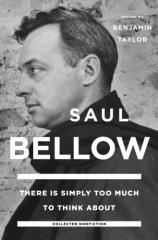There Is Simply Too Much to Think About: Collected Nonfiction
Review
There Is Simply Too Much to Think About: Collected Nonfiction
Geoff Dyer once said that when choosing a book review to reprint in a collection of essays, it is important for the piece to have “something that transforms it from being a review to a sort of essay in its own right. People either are or are not interested in Denis Johnson, say, but there are a few things in that essay that are worth raising about people other than Denis Johnson. The better the piece, in some ways, the more irrelevant it would render this issue of whether or not you had read the book in question.” Much of Saul Bellow’s collected nonfiction is made up of book reviews and literary theorizing. That “something” that Dyer looked for in his own writing is present everywhere in Bellow’s work. In a word, it is his style.
Admirers of Bellow’s fiction will delight simply in the wealth of Bellovian prose on offer in this heavy volume. In Martin Amis’ words, “His sentences seem to weigh more than anyone else’s.” In “Starting Out in Chicago,” Bellow writes the following of his decision to become a writer, some 40 years earlier: “And what was the most impractical of choices in sombre, heavy, growling, lowbrow Chicago? Why, it was to be the representative of beauty, the interpreter of the human heart, the hero of ingenuity, playfulness, personal freedom, generosity and love. I cannot say even now this was a bad sort of crackpot to be.” The combination of this Dickensian luxuriance in language and the urbane wisecracking that made Bellow’s voice such a distinctive one in 20th-century letters is one that is hard to grow tired of.
"Admirers of Bellow’s fiction will delight simply in the wealth of Bellovian prose on offer in this heavy volume.... For a book that is essentially a work of collected criticism, there is much skepticism of critics expressed throughout."
For a book that is essentially a work of collected criticism, there is much skepticism of critics expressed throughout. Even the title of the collection, “There Is Simply Too Much to Think About,” seems to refer to the futility of the whole critical endeavor. In his essay, “On Shakespeare’s Sonnets” (a review of a collection of essays about the sonnets), Bellow makes a distinction between himself and the literary critics whose work he is evaluating: “I am myself on the sidelines with the common reader.” Here he self-deprecates (or at least seems to), while elsewhere he explicitly attacks critics, whose careers he likens to “that of a deaf man who tunes pianos.”
Whether or not the distinction between a professional critic and a professional novelist who indulges, from time to time, in criticism is a meaningful one, making the distinction serves a useful purpose for Bellow. For one thing, it allows him to approach each piece with a lack of self-seriousness, a comedic impulse much better suited to his talents than a more stern-faced analysis. At least half the joy of Bellow’s work has always been his humor. The pleasure he takes from reading the essays on the sonnets is “the pleasure of seeing modern critics working hard in the early seventeenth century. It is like having mischievous children at last out of the house.” But like all good humorists, Bellow’s comedy is not an evasion of the subject, but an alternative way of approaching the subject. He really does see some of the work of modern critics as damaging to good fiction.
Despite all this evident playfulness, Bellow’s nonfiction is not unserious. Something that emerges from the book is his passionate belief in fiction, specifically of a fiction that engages directly with the world in which we live. In “The Nobel Lecture,” he gives this stirring defense for literature: “Only art penetrates what pride, passion, intelligence and habit erect on all sides --- the seeming realities of this world. There is another reality, the genuine one, which we lose sight of. This other reality is always sending us hints, which, without art, we can’t receive.”
The aesthetic that emerges from the book, somewhat unsurprisingly given Bellow’s own fiction, is one in opposition with post-modernist ideals, a desire to preserve a more concrete realism. He objects to self-conscious symbolism, “let the soda crackers be soda crackers and the wood shavings wood shavings. They are mysterious enough as it is.” Ultimately he is railing against losing sight of these “hints,” which is caused by bad fiction and wrong-headed theorists.
Reviewed by Frederick Lloyd on April 2, 2015
There Is Simply Too Much to Think About: Collected Nonfiction
- Publication Date: March 31, 2015
- Genres: Collection, Nonfiction
- Hardcover: 544 pages
- Publisher: Viking
- ISBN-10: 0670016691
- ISBN-13: 9780670016693





